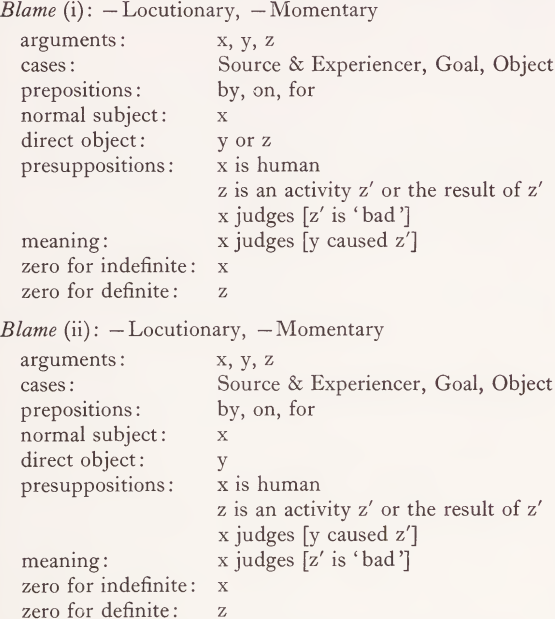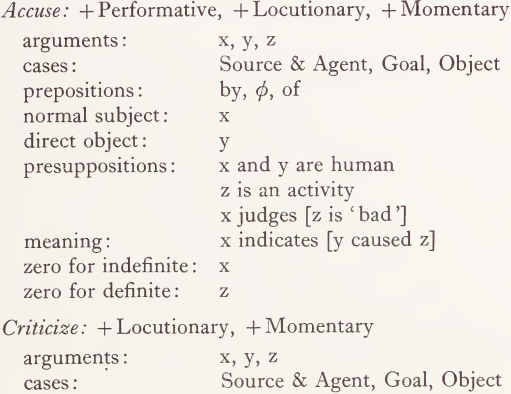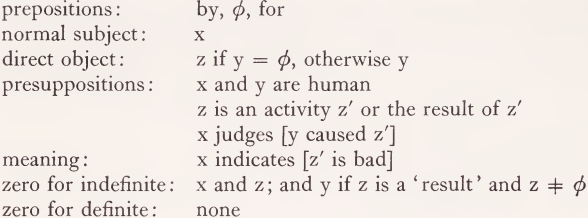
Sample lexical entries
 المؤلف:
CHARLES J. FILLMORE
المؤلف:
CHARLES J. FILLMORE
 المصدر:
Semantics AN INTERDISCIPLINARY READER IN PHILOSOPHY, LINGUISTICS AND PSYCHOLOGY
المصدر:
Semantics AN INTERDISCIPLINARY READER IN PHILOSOPHY, LINGUISTICS AND PSYCHOLOGY
 الجزء والصفحة:
390-22
الجزء والصفحة:
390-22
 2024-08-14
2024-08-14
 1050
1050
Sample lexical entries
I exhibit extremely tentative suggestions for the lexical entries for blame (in two senses),1 accuse, and criticize (in one sense). The feature-pair ± Locutionary indicates whether the verb does or does not refer to a linguistic act; the feature + Performative marks verbs which can be used in first-person simple-present utterances in the performance of an explicitly marked illocutionary act:2 the feature-pair ± Momentary indicates whether or not the verb can be used, in the affirmative, to refer to an event that takes place at a specific point in time. The variables x, y, and z are argument variables whose case-role and preposition-selection properties are indicated by first, second or third position in the next two items. All are normal transitive verbs, and the normal subject-selection for active sentences is in each case the noun-phrase that fills the Source role. For blame the direct object is either the Goal or the Object, since we have both 'blame y for z ’ and ‘blame z on y’; for accuse the direct object is necessarily the Goal noun-phrase; for criticize it is the Goal noun-phrase if that is explicit in the sentence, otherwise the Object noun¬ phrase. The verbs accuse and criticize require the Goal noun-phrases to identify human beings; blame does not, since one can blame an event on, e.g., an inanimate force. The items identified as ‘zero for indefinite’ and ‘zero for definite’ indicate the conditions under which the explicit mention of an argument may be omitted.
There are many types of lexical information not found in these sample entries. There are many facts about these particular verbs that are ignored in the descriptions provided here, for example the information that the situation named by the Object noun-phrase for blame and criticize is necessarily understood as something for which factuality is claimed (notice (90) and (91)); that the linguistic event capable of constituting a criticism is necessarily more complicated than the linguistic or gestural event capable of constituting an accusation; and that the presupposed seriousness of the offense for an act of criticism is not as great as that appropriate for acts of accusation (compare (92) and (93)). It is hoped, nevertheless, that from these examples some suggestions can be gleaned for the design of canonical representations in a lexicon.
(90) I accused John, who has never left Ohio, of taking part in the Berkeley riots.
(91) *I criticized John, who has never left, Ohio, for taking part in the Berkeley riots.
(92) I accused John of murdering his mother-in-law.
(93) I criticized John for murdering his mother-in-law.



1 There is a third use of blame in which it refers to a linguistic or otherwise symbolic act. Thus, if John wrote an offensive letter himself and did something which gave others to believe that I had done it, I could report that John blamed the letter on me.
2 In the sense of John L. Austin, as presented in his posthumous work How to do things with words. Oxford University Press, 1965.
 الاكثر قراءة في Semantics
الاكثر قراءة في Semantics
 اخر الاخبار
اخر الاخبار
اخبار العتبة العباسية المقدسة


